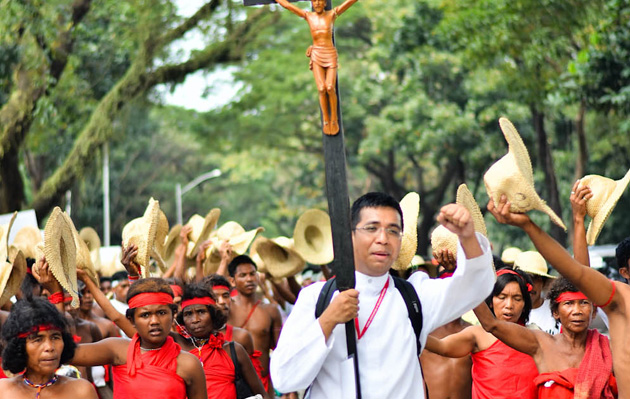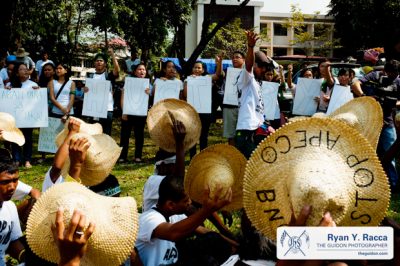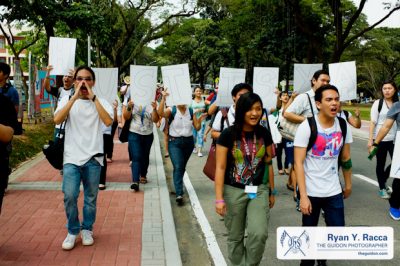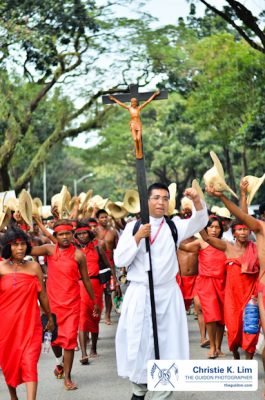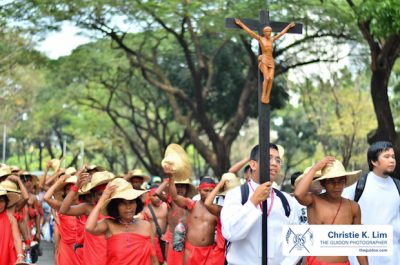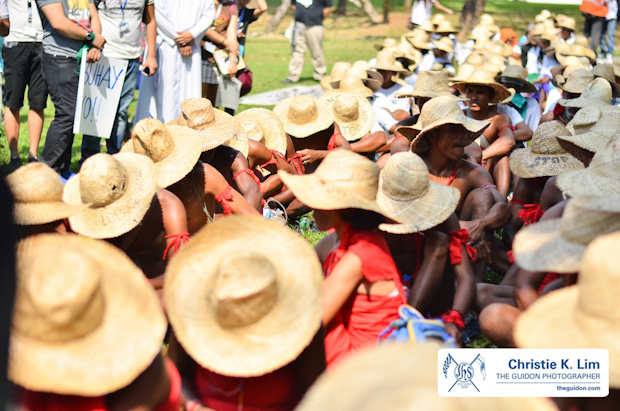
DECRYING APECO. Affected locals of Casiguran marched on campus to show disapproval of the developments in their town. Photo by Christie K. Lim
ONE HUNDRED twenty-four farmers, fisher folk and indigenous people from Casiguran, Aurora marched barefoot through the University Road in the Ateneo last December 10, 2012, in protest of the Aurora Pacific Economic Zone and Freeport Authority (Apeco).
Numerous students, teachers, administrators, Jesuits, and other members of the community joined in the march.
Their arrival marked the eighteenth day of their 370-kilometer march from Casiguran, dubbed “Lakad Katarungan, Lakad Matuwid na Daan.” Their goal was to convince President Benigno Aquino III to hold the budget of Apeco.
“Lupa namin, inagaw, inagaw! Sinong nang-agaw? Apeco! Angara! Bakit inagaw? Gahaman! Gamahan! (Our lands, grabbed, grabbed! Who grabbed them? Apeco! Angara! Why were they grabbed? Greed! Greed!),” echoed the marchers’ chants across the campus, as they trudged on closer to their final destination of Malacañang Palace.
Apeco is a multibillion-peso project that aims to turn 12,923 hectares of Casiguran into a business and tourism hotspot. The special economic zone lapsed into law as Republic Act (RA) 10083 in 2010, amending RA 9490 from 2007.
Senator Edgardo Angara and Lone District of Aurora Representative Juan Edgardo Angara spearheaded the creation of Apeco. Aurora Governor Bellaflor Angara-Castillo endorsed the project.
Critics allege that the project has displaced a number of locals and the native Agta tribespeople.
Five days before the arrival of the marchers, a talk aimed to present the side of Apeco was held at the Leong Hall Auditorium. In attendance were Malcolm Sarmiento, Apeco’s current president and chief executive officer, as well as chieftains and barangay captains from various Casiguran towns who supported Apeco.
Sarmiento said that Aurora and the other provinces on the country’s eastern seaboard deserve a chance to benefit from major government investments in infrastructure and other economic initiatives in the area. The Casiguran marchers, however, decried Apeco for supposedly doing more harm than good.
Bicolano Ilocano Casiguran Farmers Association President (Bicfa) Elmer Gonzales lamented the consequences of Apeco. “Dapat po ba ang sakahan ay [baguhin] at palitan ng building na itatayo ng Apeco? Ang magsasaka na siyang unang [maaapektuhan] ng Apeco, na mawawalan ng sakahan at mawawalan ng pagkakahanapbuhayan—tama po ba ito? Ang mga mangingisda ay mawawalan ng kabuhayan dahil sinakop ng Apeco ang mga baybayin kung saan nandito ang mga pabrika na ang mga gamit ay walang ibang tutunguhan kung hindi ang dagat na pangisdaan. (Should the farmlands be exchanged for Apeco’s buildings? Is it right that the farmers, who will be affected by Apeco first and foremost, lose their fields and their livelihoods? The fishermen will lose their livelihoods because Apeco is taking over the coastal areas and building factories whose waste will have nowhere to go but the fishing waters.)”
He added, “At sa mga katutubo, alam po natin na bawal sa konstitusyon na ang mga lupaing ninuno ay pakialaman ng ating gobyerno. Huwag po nating sirain ang kasaganahan na nagmumula sa pagsisikap ng mga taga-Casiguran (And for the natives, we know that the Constitution bars the government from intruding into ancestral lands. Let us not destroy the wealth that came from the hard work of the Casiguran people).”
Critical response
The Casiguran folk were to march to Malacañang Palace a day after their arrival in the Ateneo. On December 11, however, Aquino himself arrived on campus along with many of his cabinet secretaries. A meeting was held with the marchers at the San Jose Major Seminary covered courts.
During the meeting, Aquino ordered the National Economic and Development Authority to conduct a review and a feasibility study on Apeco. He said that he would base reconsiderations, if any, on the findings.
Task Force Anti-Apeco (TFAA) Head Jerik Cruz said that the marchers were directly appealing to Aquino in the meeting, as he had the power to effectively block the project by vetoing its budget allocation. Aquino refused to do so.
Aquino said, “Ako, nakikiusap lang, sana magbukas tayo ng isip. (I’m just asking you to be open-minded.)”
The visibly irked president continued, “Sandali lang ah. Sabi niyo tigilan ko ‘yung budget, o ibigay mo ‘to. Hindi ako diktador eh. Bilang pangulo, chief executive, ano ba ang i-eexecute ko? ‘Yung batas. Kailangan kong ipatupad ‘yung batas. Kung mali ‘yung batas, papalitan natin ‘yung batas. Pero habang batas ‘yan, obligado po akong ipatupad. (Wait a minute. You’re telling me to stop the budget, or give this. I am not a dictator. As the president, chief executive, what should I execute? I have to execute the law. If the law is wrong, we’ll change it. But while [Apeco] is a law, I am obliged to execute it.)”
Lawyer Christian Monsod, the marchers’ legal counsel, offered a rebuke to Aquino. “The solutions that we are hearing, while they sound good, do not address that basic premise. That’s why they’re asking for a thorough review of the concept itself of Apeco.”
The dialogue with Aquino left one marcher with one word to say as the president exited the venue: “Bingi! (Deaf!)”
While Aquino’s final positioning on the matter remains to be seen, the marchers have found an ally in Luis Antonio Cardinal Tagle and Commission on Human Rights Chairperson Etta Rosales.
At a conference held in the Cervini Residence Hall Recreation Room on the same day the marchers arrived on campus, Tagle thanked those who walked from Casiguran and ensured them of the Church’s support. He remarked that the fight against Apeco is a movement of love for the family, the land, the sea and the richness of nature.
The cardinal expressed sadness at how Filipinos were hurting each other. “At para saan? Sulit ba? Sulit ba itong sakit ng paghihiwalay doon sa ipinapalit? (And for what? Is it worth it? Is the hurt worth what is in exchange?)”
Tagle hoped that the country would listen to the Casiguran marchers.
Meanwhile, Rosales was among seven speakers at a press conference held at MVP 102.
Rosales said that every government policy and development program that is enforced should be anchored on human rights that are universally agreed upon by all parties.
“It’s not wrong to build [a] free port, but we are only going to do it based on the capacity and goodness of our citizens that are situated in that province,” she stressed.
Clamor for justice
Agta tribesman Armand dela Cruz explained how Apeco had created a rift among his people. He said that around 75% of the natives have been coaxed to Apeco’s side because they did not understand the law. He said that the rest are those who know that they are being robbed.
“Mahirap po ‘yung nakapag-aral ka, kahit kaunti, kasi nakakaintindi tayo, nakakaunawa tayo ng mga pang-aapi (It is difficult when you have studied, even just for a bit, because we recognize and understand oppression),” said dela Cruz.
He expressed his wish that, instead of the economic zone, schools had been constructed in their areas and fishermen were assisted with equipment.
Marlon Angara, a fisherman, was saddened by how his own namesake is allegedly taking away his livelihood. “Angara po ang kalaban namin—ako ay napakaliit na Angara. (Our enemies are the Angaras—and I am just a puny Angara.),” he said.
“Hindi naman po lingid sa lahat na ang Casiguran ay napakayaman. Nandiyan po ‘yung malalaking isda at ‘yung pinapangalagaang endangered species katulad ng pawikan at butanding. Pero sa pagdating po ng Apeco na ito, sigurado po sila’y unti-unting mawawala. (It’s a known fact that Casiguran is rich in resources. Huge fishes and protected endangered species like turtles and whales reside in its waters. But with Apeco’s arrival, surely, they will gradually disappear.),” he said.
The marchers and the TFAA have also questioned the legality of Apeco.
“If you look at the law, there’s a very clear provision saying that the establishment of the [economic] zone shall be subject to the concurrence of the local government units affected,” said lawyer Marlon Manuel, referring to the Local Government Code. He asserted that the municipality of Casiguran gave no consent to the project.
Opponents of Apeco also claim that the project will destroy around 300 hectares of agricultural land, a violation of the Comprehensive Agrarian Reform Program Extension with Reforms law. It has also purportedly failed to comply with the Fisheries Code by displacing fisher folk without securing their relocation and support.
The project is also being questioned on the grounds of violating the Indigenous People’s Rights Act by entering 11,900 hectares of the Agta Dumagat’s ancestral lands without their free, prior and informed consent. Several reports of human rights violations have also surfaced.
Gonzales, Bicfa president, said that while he was not against the project’s development aims, there was something wrong with the way it was put in place. “Ang palagay ko, ang bawat batas na nag-umpisa sa mali ay mali ang patutunguhan. (I think that every law that starts awry will only lead to more wrongs).”
Apeco’s defense
“We are fully aware of the serious issues raised against the creation and operation of this particular ecozone,” said Apeco CEO Sarmiento in the talk held last December 5 presenting Apeco’s side.
In the open forum that followed Apeco’s presentations, Ateneo Task Force Anti-Apeco (ATFAA) Head Tricia Raya asked if Apeco would be able to provide for the lost livelihoods of the displaced farmers and fishermen.
Sarmiento answered that their policy was that Casiguran residents would be prioritized in employment. “That is the very reason why the ecozone is there: to provide more income, to generate more jobs, to create more livelihoods, not for people from outside, but for Casiguran and the neighboring towns.”
He added that they had recently put up an ice plant in Barangay Esteves, something he claimed they would not have done had they been neglectful of the fisher folk’s livelihood. The ice plant, he said, would help fisher folk earn more because they would be able to sell their catch themselves in farther and better-paying markets.
In response to the accusation of Apeco’s encroachment on agricultural and ancestral lands, Sarmiento pointed to the Special Economic Zone Act of 1995. “The law encourages economic growth and the development of special economic zones, which are areas that government designated for development into balanced agricultural, industrial, commercial and tourist-recreational regions.”
Sarmiento added that the law specifically mentioned Aurora as a development area.
Ching Descarga, a tribe leader brought by Apeco to the December 5 talk, defended Apeco. “Huwag po nating sabihin na inaagaw ito at hindi kami ginagalang (Let us not say that [our land] is being taken away from us and that we are not being respected).”
“Mayroon kaming nirereserba na mananatiling kagubatan dahil isa po sa aming kabuhayan ang mag-hunting. Ayaw po naming mawala ang kagubatan sa amin dahil ito po ang aming buhay (We reserved an area of the land to remain as forests because one of our livelihoods is hunting. We don’t want to lose our forests because this is our life.).”
Sarmiento asserted that Apeco is transparent with its financial activities and is willing to show records.
He said that the budget allocated for the project must not go to waste. “The choice is clear and unambiguous: either we allow Apeco to slide into ignominy as another white elephant or make good use of the millions that have already been invested there for a chance to create another economic market.”
Sarmiento guaranteed that Apeco would usher in a new era of progress.
Atenean efforts
Although the university administration has not released an official stand on the issue, the Anti-Apeco movement has a strong presence on campus.
The ATFAA was forged to promote awareness of the issue, especially among students. The task force also carried out a petition-signing effort and organized a prayer rally and a photo exhibit on the issue.
“Anything that comes from this school will be respected. I think it’s time for the students to produce that kind of statement [regarding Apeco] for the school,” said ATFAA member Mark Bullo.
ATFAA member Kevin Mizon also commented that the Apeco issue is an opportunity for the concrete manifestation of lessons on social justice and preferential option for the poor. “You [as an Atenean] are not affected, really. But the thing is, as an Atenean, you should transcend that box that you’re in and actually help out these people. It’s an application of what we are continuously taught here in the Ateneo,” he said.
Raya, meanwhile, said that their stand on the issue might be difficult for many students to understand. “I believe that their fight is also ours. When we think about the issue, we ordinarily think that [the people of Casiguran] are not connected to us. However, we need to see that what is happening to them is not separated from our being human,” she said in Filipino.
In an earlier interview with The GUIDON, Raya said, “Being in solidarity with the marginalized is what Ateneo has been teaching us all along. Atenean education is very much rooted in [Catholic Social Teaching], which teaches us to change the structures of oppression.”
Fr. Jose Francisco Talaban of TFAA recounted how Ateneans have helped the Casiguran folk. “For [the people of Casiguran], this is part of their history and part of their story that they will never forget in their lives—that they protected, insisted and stood for their rights, and that Ateneans helped them and got involved,” he said in Filipino.
The Sanggunian had also long released a stand questioning Apeco and calling for a rejection of its budget. “We believe that although economic development is a noble aspiration that the Philippines should pursue as a nation, social justice must always be a central principle in every political endeavor,” said its statement, which was approved by the Central Board on September 21, 2012.
Other student groups that had released stands against Apeco include Crusada, Entablado and Matanglawin.
The GUIDON released an online editorial against Apeco last December 14, 2012.
With reports from Billy B. Poon, Henry I. Oh, Jose C. Cua and Luther B. Aquino
Editor’s Note: Kevin Mizon is a member of The GUIDON’s Inquiry Staff. He had not been involved in the writing of this article.
- Photo by Ryan Y. Racca
- Photo by Ryan Y. Racca
- Photo by Christie K. Lim
- Photo by Christie K. Lim

